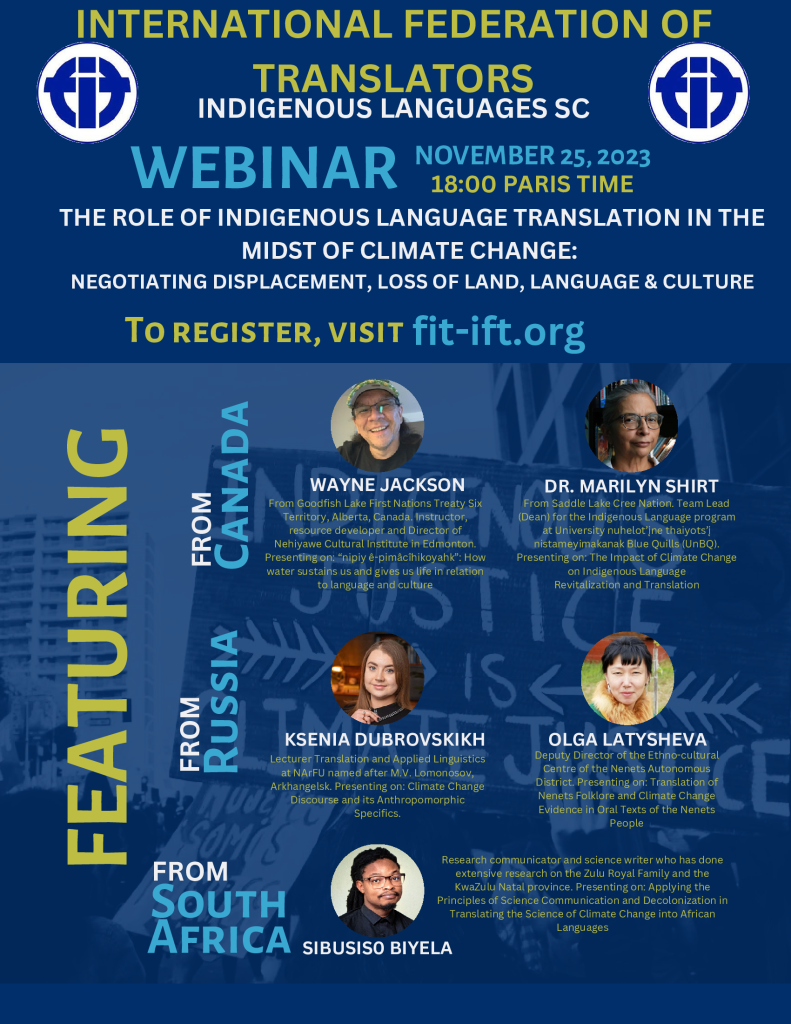
On 25 November 2023, in this International Decade of Indigenous Languages, the FIT Indigenous Languages Standing Committee hosted a panel discussion to highlight the critical loss of the world’s indigenous languages and the urgent need to preserve, revitalise, and celebrate them. The intercultural event brought together speakers from Africa, Arctic Russia, and Canada in a conversation on the far-reaching effects of climate change that have found their way into oral traditions, folklore, literary discourse, language revitalisation, and day-to-day life. The event was opened by Alison Rodriguez, FIT President, followed by Roula Salam, Standing Committee Chair.
The first speaker, Wayne Jackson from Goodfish Lake First Nations Treaty Six Territory, Alberta, Canada, is a certified translator, instructor, resource developer and director of the Nêhiyawê Cultural Institute in Edmonton. Wayne spoke movingly on ‘nipiy ê-pimâcîhikoyahk’, how water sustains us and gives us life in relation to language and culture. He shared images and recollections of his experiences with natural bodies of water as a child and as an adult from the Nehiyawe (Cree) community, recounting how Indigenous livelihoods that depended on the lakes for water and food have been severely impacted by industrialisation and man-made climate change.
The second speaker, Sibusiso Biyela from South Africa, is a science and research communicator at ScienceLink whose research documents the lifestyle of Indigenous Zulu tribes. Presenting on ‘Applying the principles of science communication and decolonisation in translating the science of climate change into African languages’, Sibusiso described the importance of using translation to convey scientific ideas on climate change in a way audiences can appreciate and understand as a critical means of decolonisation.
From the Nenets community in Arctic Russia, Olga Latysheva, Deputy Director of the Ethno-Cultural Centre of the Nenets Autonomous District, spoke through an excellent Indigenous interpreter on the ‘Translation of Nenets folklore and climate change evidence in oral texts of the Nenets people’. She shared how climate change has been reflected in the language and imagery used in traditional Nenets folklore using beautifully translated descriptions. Ksenia Dubrovskikh, lecturer of translation and applied linguistics at the Northern Arctic Federal University, focused on ‘Climate change discourse and its anthropomorphic specifics’, studying the language of climate change from an anthropocentric perspective and showing how language interacts with ecology. Finally, Marilyn Shirt from Saddle Lake Cree Nation in Alberta, Canada, Dean of the Indigenous Language programme at University nuhelot’įne thaiyots’į nistameyimâkanak Blue Quills (UnBQ), presented on ‘The impact of climate change on Indigenous language revitalisation and translation’. Marilyn’s depictions of the harsh realities brought about by a history of colonisation coupled with the challenges of the effects of climate change on family displacement and shifts in traditional practices highlighted the importance of translation and teaching the younger generation.
The event was a great success. Be on the lookout for a recap video on the FIT YouTube channel.
Roula Salam, FIT Council
